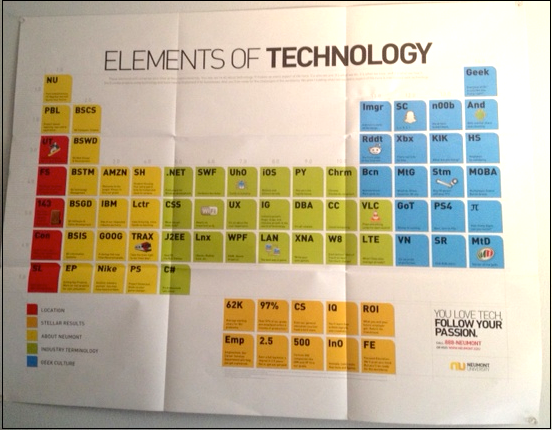
If you want to get me ranting and foaming at the mouth, talk to me about the state of education here in the U.S.
From killing imagination, creativity and innovation in our children because we now teach them to pass tests (versus how to think) to running our schools on an antiquated system developed in the 1800s when we were a nation of farmers, our educational system is broken. Period.
This failure to thrive doesn’t stop at grade 12 either. We then send our pre-programmed, stressed out kids to college – where they major in stifling pre-packaged programs developed in the 1950s.
Our kids major in a course of study and come out four or five years later burdened with debt and unable to find a job.
Why? Because the jobs for which they’ve been prepared are scarce or have gone the way of the rotary telephone (hello? Journalism anyone?). For the jobs that do exist, or have yet to be created, they’re also not prepared.
That’s why I was particularly intrigued when my son, who is entering his senior year of high school come September, received a letter from Neumont University in March.
In case you haven’t been through this process yet, once your college bound child hits his or her junior year, he or she begins to receive dozens of letters from universities.
I read many of these letters. Talk about lack of creativity and energy — UGH.
After the initial excitement of receiving mail on a daily basis, my son would open the letters, quickly scan, and then toss.
Except he didn’t toss one – the letter from Neumont University.
“Neumont Who?”
That’s what my son’s guidance counselor said when my son excitedly told him about Neumont University. Located in Salt Lake City, Utah, Neumont is a different kind of university, and it’s this difference that caught my son’s eye – and my eye – with the opening sentence of its letter.
“Many traditional four-year colleges are expensive, theory-intensive, and time-consuming with an uncertain outcome. Neumont University is different. Here’s how…”
The letter then goes on to explain these reasons:
- Everyone at the university has a passion for technology
- The school offers only five BS degrees, including Computer Science (what my son wants to major in)
- The students who attend want nothing to do with old-style, lecture-hall learning
- You can earn your BS degree in 2.5 years – by attending school five days a week (and with three weeks between breaks)
“Hey mom,” my son said as he popped his head in my office, “take a look at this letter. This school is for geeks just like me!” (Yes, the apple didn’t fall far from the tree – ha!)
In addition to the letter, a full-color, over-sized gate-folded brochure gave all the reasons why Neumont is different. As soon as I saw it, I got goose bumps.
Talk about creative, out-of-the-box marketing! This school definitely got it!
Not only did it get marketing and its target audience, but the school had completely re-engineered the college education experience. Gone were the boring four years and useless General Education requirements. In their place was a streamlined curriculum geared toward helping students get their degrees while learning skills in use today (not yesterday).
So we went to the school’s website and filled out a form for the Viewbook – and now the school is in contact with my son. They’ve called to talk to him – and then use what he tells them in follow-up emails. They sent him this way cool chart, “Elements of Technology.”
As soon as he received it, he hung it up on his wall.
“Now this is cool,” he said.

Why small manufacturing industrial companies struggle with marketing
I’ve had the Neumont materials sitting on my desk since March, but it wasn’t until recently that I understood why they struck a chord with me.
Yes, their marketing is exceptional. I could do five individual posts about different aspects of it. It’s that good.
But what I’ve slowly begun to realize is that Neumont’s marketing strategy is one I employ when helping my small industrial manufacturing clients with their marketing.
In a Manufacturing.net article, “The Family Business,” Michael Collins states that small, family-run manufacturing companies aren’t small versions of large manufacturers.
He goes on to state: “One of the most popular approaches to helping small manufacturers is the assumption that the same theoretical concepts or solutions pioneered by giant manufacturers will also work for small manufacturers. If the solution does not consider ‘FACTS’ and the type of company, it can harm rather than help family-owned manufacturing companies.”
His statement is particularly true with regard to marketing.
Small, family-run manufacturers are different
One of the things I love about the Neumont brochure is the part where it says, “We Get You” and then goes on to describe its ideal student:
- You love technology.
- You like a challenge.
- You hate wasting time.
- You want a career, not a job.
“Our students don’t wait until after graduation to do cool stuff. They start innovating now,” says the brochure copy.
I especially love that they used photos of real students — vs. tired, over-used stock imagery — along with benefits that appeal to geeks: “Roommates who can sleep through the clickety-clack of a computer in the wee hours of the morning.”

The same is true for family-run manufacturing concerns. According to statistics from the National Association of Manufacturers, U.S. manufacturers:
- Are the most productive in the world, far surpassing the worker productivity of any other major manufacturing economy, leading to higher wages and living standards
- Perform two-thirds of all private-sector R&D in the nation, driving more innovation than any other sector.
- Contribute 12.5% of the GDP
Taken alone, according to the stats, manufacturing in the United States would be the 8th largest economy in the world.
Based on my 15+ years of working small industrial firms, I know for a fact that these firms, whether large or small, create new markets, new products and new ways of doing things — often with very little fan-fare. (That’s because the owners of these companies don’t see themselves as being rock-stars, even though they are. They just call it “doing my job.”)
They also have to deal with concerns that other companies simply don’t have – especially with regard to the crushing regulations being imposed on them.
And lastly, the reasons for how and why they market their products and services are very different than for other types of products and companies.
Yet for all these differences, the marketing advice being given to small industrial manufacturers is totally and completely off the mark and thus often falls on deaf ears – in much the same way the dozens of boring college letters my son received found their way in the recycle bin.
How we do business has definitely changed. Small industrial manufacturers do need to begin changing how they market in response to these changes. I get that. They get that.
But, rather than slap scaled-down Big Boy Company approaches on them – and then call it a day – my approach is to take into consideration our clients’ challenges, their strengths – and the uniqueness of their businesses.
Filed under: Our Thinking

Rachel Cunliffe
This is a fantastic post Dianna – the marketing for Neumont is wonderful! The education system (from Day 1 onwards) in the US is so different to New Zealand – some Americans yesterday were talking to me about the education debt burden (and often much more costly than four years as young people have no idea what to study and switch around).
In New Zealand/Australia, it’s very common and socially acceptable to do your “OE” (overseas experience) or “gap year” where, after five years of high school, you take a year off to work locally in a service/retail type job, or work while traveling internationally – to broaden your horizons, to take time to explore what you want to do in life before committing to it (and its associated costs).
But I digress! Your approach to marketing for small business is fresh and trustworthy. There’s plenty of companies out there saying “you should…” and it’s just one more thing to be added to their “should” pile.
I hope you can connect with more of them and make a real difference.
Dianna Huff
Rachel,
Thank you! I agree about a gap year and have been thinking more about it for my son. I keep telling him he doesn’t have to do the traditional four-year college thing — but he’s getting lots of pressure from his guidance counselor to think “brand name” school, etc.
And, thank you for your encouragement with regard to my marketing approach. I appreciate it!
Rachel Cunliffe
I don’t know the US college system, but I can’t imagine a gap year would make a difference to his chances of admission?
His guidance counselor is probably paid by colleges 😉
And you’re welcome!
Dianna Huff
No, no difference. And you made me laugh with your line about the guidance counselor. 🙂
Attracting Millennial Workers: Make Manufacturing Sexy
[…] Both would learn so much from each other. Most importantly, the manufacturer would learn how Millennials think, what excites them, and how to communicate with them in new and fresh ways. […]